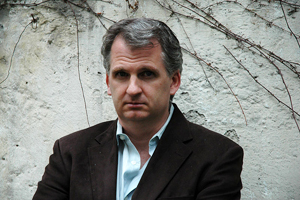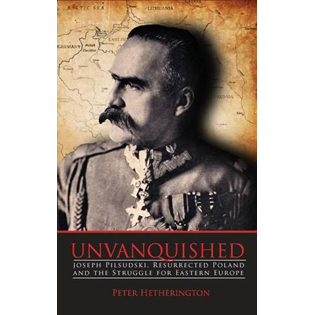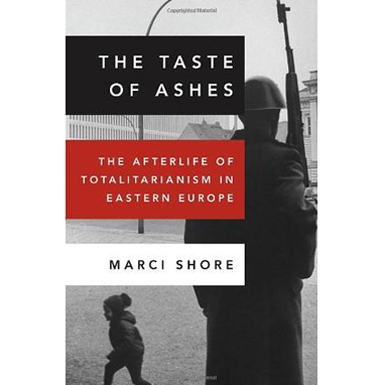 WARSAW – As one of the rare specialists in the history of modern nationalism and the history of Central and Eastern Europe who give thoughtful insight on current events in the light of the past, Timothy Snyder, from Yale University, was the perfect interview subject to answer questions about how Poles could use their past to build a better future. As a visiting lecturer at the College of Europe in Natolin, Warsaw, Snyder took 20 minutes between two lectures to chat with CR.
WARSAW – As one of the rare specialists in the history of modern nationalism and the history of Central and Eastern Europe who give thoughtful insight on current events in the light of the past, Timothy Snyder, from Yale University, was the perfect interview subject to answer questions about how Poles could use their past to build a better future. As a visiting lecturer at the College of Europe in Natolin, Warsaw, Snyder took 20 minutes between two lectures to chat with CR.
In Sketches from a Secret War, you make two statements that could upset contemporary Poles. Talking about Piłsudski, you say that “Poland was too important to be entrusted to the Poles… History is made by individuals,” and “Piłsudski’s conspirators knew that they had won Polish independence despite the indifference of many Poles.”
Are Poles — except for some exceptional individuals — still indifferent to the fate of Poland?
T.S.: First of all, I want to make clear that the sentences in the book are Piłsudski’s own views accurately recorded by me. If Poles have a problem with this statement, that’s an argument with Piłsudski, not with me. That’s important because I’m trying to characterize a justification for authoritarianism. Those statements are attempts to justify Pilsudski’s authoritarian regime.
To answer the question whether Poland was too important to be entrusted to the Poles: a nation is only valuable as long as its people care for what’s best in it, and sometimes those are not the people belonging to the nation. Sometimes people from the outside have something to offer to the nation as well. For example: universities. You are representing Poland in the Rockies, so for you it makes sense to talk about Poland in a place far away from Poland.
In the same sense, I think America is too important to be left to Americans, and that any nation is too important to be left to itself. A nation that listens only to itself is a nation that has serious problems. I’m very happy that Obama got elected, but I was also happy that his election pleased many citizens of many nations around the world.
The real question would be whether Poland has changed since the 20s and the 30s. Clearly, yes. No one today could make the statements Pilsudski made. Polish national consciousness is now almost universal. Most people living in Poland today think of themselves as Poles. They are capable of feeling guilty if they shirk their responsibilities to the state, and that’s the definition of national identity. The real question is whether you feel proud about the achievements of your country, but also ashamed about the evil things it committed. Do you feel responsible?
In that sense, Poland is a different society now than 80 years ago.
Pilsudski wasn’t wrong, but we shouldn’t look at the 20s and say that period was like today’s society. There were then a large number of peasants who did not identify strongly with Polish society. It’s the Second World War and communism that made national consciousness universal in Poland.
No one would really disagree that the communist regime had a lot to do with the creation of national consciousness. Communists made national culture universal. They made sure most people spoke literary Polish. While we take for granted that everyone spoke literary Polish, in 1926, that wasn’t the case. Many people didn’t speak the same Polish and didn’t understand each other.
Furthermore, opposition to communism created the sense that the nation could achieve something. Solidarity was a great moment where a nation without a state did something great without resorting to violence.
Do Poles have a clear vision of what Poland is, or what it should be?
It strikes me these are questions for Poles, not a historian. There are many visions of what a state should be, and that’s normal. If there is one vision of the state, then you are in an authoritarian system. It is a mistake to think there should be unity in this vision.
Do Poles know enough about their own history?
Poles know a lot about their own history. Teaching Polish students is always pleasant. Up to high school, they generally have a much better education in history than in other European countries and America.
I think the problem is not one of knowledge. Like all nations, Poles have a tendency to see history in a certain way: in terms of heroes or victims. This is a universal disease: not only Poles do this. It’s not particular to the Poles.
I think there are certain parts of Polish history that are flattering to the Poles and others less. They are still to be researched. For example, as a result of communism, Poland’s relations with its Eastern neighbors are not explored.
The engagement of Poland in nation building in Ukraine is something a lot of Poles do not know about. That could be researched.
How is history instrumentalized in Polish politics?
This is something that is done in every modern democracy. Poland is a special case because people care more about history here. It is an unusual example of where the 20th century was very bloody and where, at the same time, debate is now completely free. You can discuss what happened. In Ukraine and Belarus discussion about it [violence] is not completely free. The only examples of such a combination in Europe are Poland and Germany.
Poland combines a very tragic and heroic history with a possibility of free discussion. Of course, history is then going to be instrumentalized.
This happens in France and the US as well, but their recent histories are less dramatic, so there is less to instrumentalize. In Poland there is the history of communism to instrumentalize.
You are really asking about polityka historyczna. I think it’s a very good thing for citizens to know history. I think in that sense polityka historyczna is a very good idea, especially for Poland. Poland has a really weak position in Europe for Poles to know their own history.
It’s also a question of interpretation. There, the government is entering into difficult territory. It’s important for Poles to know about their own history. It’s very important that they are familiar with the dramatic events of the twentieth century, such as the Warsaw Uprising. However, the official interpretation that it was a good idea is a different matter. Poles have different opinions regarding this matter. Discussion about it should flourish.
Another way communist history is being instrumentalized is by young generations, by Poles who are too young to have experienced communism. I’m thinking about the lustration law. It’s a very strange thing when people who didn’t live as adults in communism sit in judgment. Sometimes it seems that we assume everyone who is young would have behaved well; and of course not everyone would have. I sometimes think that younger people who are the most aggressive about lustration might be the very people who would have been quite likely to collaborate with the communist regime. They sometimes seem to be motivated by personal ambition, which is why many people of older generations joined the party.
What is the role of education in this context?
T.S.: This is the great opportunity for Poland to turn Polish historical scholarship and historical consciousness into European historical consciousness and scholarship. Poland would win a great victory if Polish history could be integrated in European history. This is a frightening prospect. Many Poles think Europeans don’t understand them, and that’s true.
On the other hand, if European history could be taught in a way the Warsaw Uprising could make sense to people in Portugal, or if Solidarity made sense to Denmark and France, then it would help them to think about Poles as part of the same community and it would help Poles to feel understood and not marginalized. European history is an example of how Poland could do well by doing good. Poland shouldn’t try to control interpretation of its history. I do think that the EU has reached a point where deeper identity writing cannot be attained without a better understanding of East European history.
CR




Pingback: Warsaw 1944: Hitler, Himmler, and the Warsaw Uprising